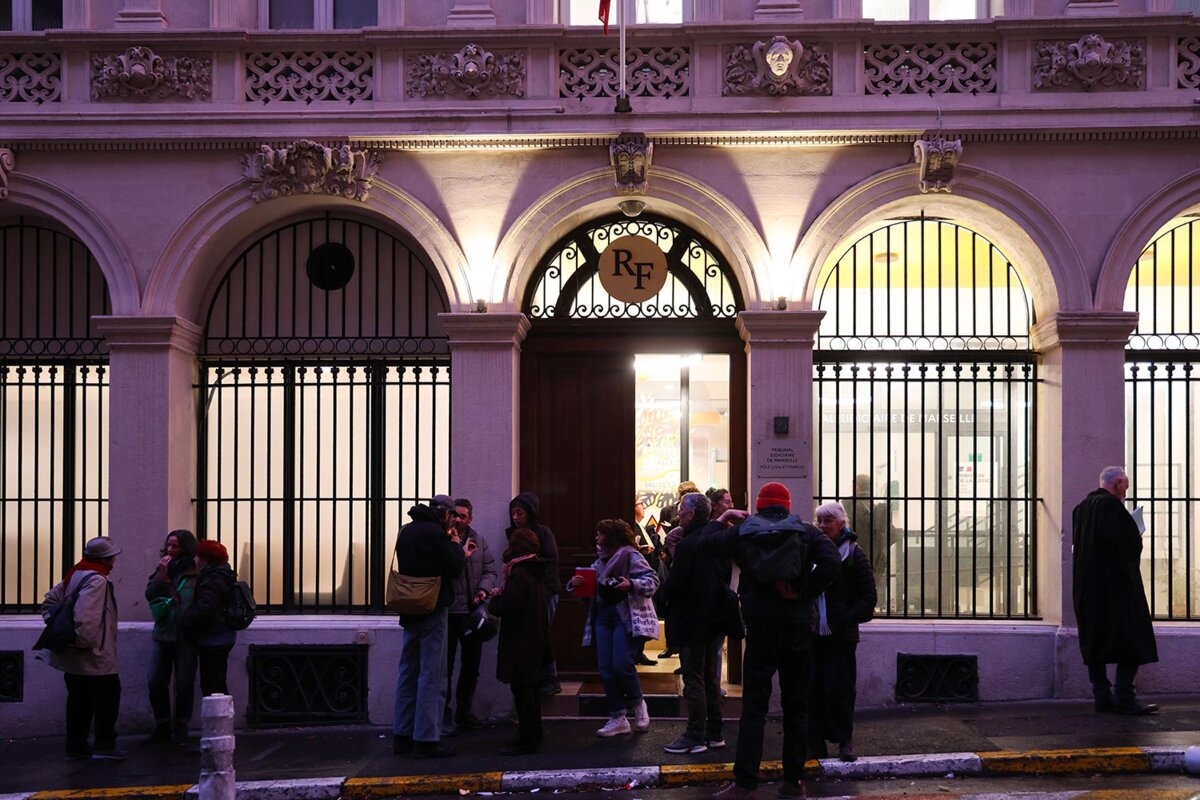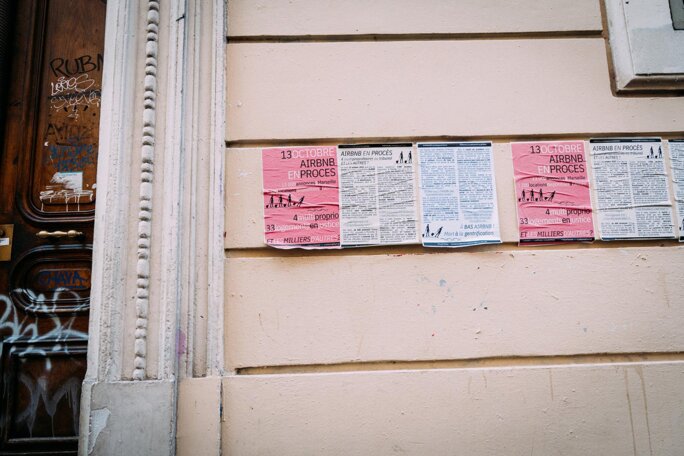In the first case of its kind, the City of Marseille authorities are suing four landlords for violating the regulations regarding short-term rentals of their properties via tourism sites such as Airbnb, in an attempt to rein in a lucrative market that has spun out of control.
The backdrop to the move is a dire crisis in rented accommodation in the Mediterranean port city, with demand strongly outstripping supply. According to the city authorities, advertised long-term rentals fell by as much as 80% between 2023 and 2024. One of the causes, along with a steady rise in property prices, is the boom in short-term rentals to tourists, typically via online platforms like Airbnb, which offer far higher returns for landlords than long-term rentals.
There are strict regulations surrounding the short-term rentals, including a limit to number of days per year they can be offered, and these are flouted by unscrupulous landlords who buy up buildings of family apartments and chop them up into rental studios, bypassing basic health and safety regulations in the process.
The authorities’ case against four landlords (two of whom are a couple), heard in court on Monday, include illegal rentals in two multi-story buildings whose owners were served with orders to carry out urgent structural repairs to avoid the collapse of the structures.
The case was heard before a full house at the civil affairs tribunal at the city’s central lawcourts, which was packed with journalists, housing association activists and evicted tenants.
In a long introduction presenting the housing crisis in Marseille, the city hall’s lawyer, Jorge Mendes Constante, said that out of 12,800 advertised Airbnb rentals studied by city hall, 6,000 were illegal because they had not sought official municipal authorisation or had bypassed regulations. But, he said, “the aim is not to cause congestion of the courts by suing the 6,000 people. This trial must have a pedagogic value” – in other words, he wanted the trial to serve as an example. He called for dissuasive fines to be handed down to the four defendants – in one case more than 1 million euros.
“It’s also a warning to landlords who are outside the law and who don't ask themselves many questions,” said city council member Patrick Amico, in charge of housing. He and his colleagues face municipal elections in four months’ time, when the housing crisis will be high on the agenda.

Enlargement : Illustration 1

The first of the cases to be heard was that of Vincent Challier, a cosmetic surgeon and landlord from Périgueux in south-west France, more than 600 kilometres away. He had become a symbol of the excesses of the Airbnb model following his appearance on a French TV current affairs programme, Complément d’enquête, when he admitted his short-term rentals in Marseille were illegal, explaining that “it’s Marseille, baby” – a phrase (“c’est Marseille, bébé”) first coined by a local rapper and now common parlance to mean “here it’s normal”, and which he said was often repeated to him.
In this context, Challier was not referring to the city’s notorious criminal underworld but to a local culture of wheeling and dealing.
He is accused of offences surrounding a building he owns in which he rents out 14 rooms as short-term rentals, at a rate, in 2024, of 50 euros per night. These were created from a much smaller number of traditional apartments in the building.
Mendes Constante told the court that in the TV current affairs programme Challier said that he had “not violated anyone”. But, said the lawyer, “he has violated the law for years”. Challier, he detailed, originally bought a whole building comprised of six family-sized apartments, which he turned into the 14 rooms, without having planning permission. He also reminded the magistrates that Challier had again been interviewed on camera, this time to regional TV network France 3, when he admitted renting his studios informally.
Like his co-defendants, the surgeon was not present in court.
Mendes Constante asked for Challier to be handed maximum fines of 100,000 euros for each illegally transformed apartment, and fines for a series of other offences related to his renting activity which in all total more than 1 million euros.
Challier’s lawyer, Pierre Le Beller, depicted his client as a generous investor in Marseille’s crumbling properties. “To buy up a degraded building, to put it back in shape – that’s not reprehensible,” said Le Beller.

Enlargement : Illustration 2

“In the beginning, for this building, he had a project to lodge medical students, this project did not finally take place,” continued Le Beller, unconvincing the public gallery from where giggling could be heard. As for the interview he gave to “Complément d’enquête”, Le Beller said it was a moment when Challier had an epiphanous awakening to the error of his ways and immediately made contact with the City Hall to put his business in line with the regulations.
The lawyer recognised the “emotion” prompted by his client’s case, but asked the court “not to make a symbol of someone who showed himself to be cooperative with the city hall,” adding that “he does not have the profile of those investors without scruples.”
The next case to be heard was that of Mehdi Guennouni, a Parisian property developer, who owns a building at 31 rue Barthélémy, in the city’s 1st arrondissement, which he, similarly, cut up into small units from its original apartments, without receiving authorisation. “His project was that of fraud, from beginning to end,” argued Mendes Constante, who said the disastrous consequences of the transformation were that it is now in an advanced state of degradation and placed those who lived there in danger. The building is today the subject of an order from the municipality for urgent repairs.
“All this legislation is very complicated”
In a video report by Mediapart, one former woman tenant of an apartment in the building, and a man who is still renting accommodation there, spoke of the pressure exerted on them to leave the building so that the conversion could continue. In the case of the woman, she awoke one morning to find her ceiling collapse onto her bed, which she filmed on her phone, due to the conversions being built above her.
Eventually, the walls of her apartment began developing deep cracks and the local council gave her emergency housing because of the danger, which it decided included a possible collapse of the building.
Mendes Constante asked for Guennouni to also receive a maximum sentence. “I’m not asking for a symbol, I’m asking for the law to be applied,” he said.
In the same vein, but for different reasons, Guennouni’s lawyer, Olivier Burtez, appealed to the presiding magistrate to rule strictly on the letter of the law, and by the principal of individualisation, as opposed to a collective punishment of the defendants. “This notion of exemplarity doesn’t please me,” he said, adding that he had known the late mayor of Marseille, Gaston Defferre, a high-profile post-war socialist figure in France, saying that he knew very well that the housing crisis in Marseille is not down to tourist rentals alone. He underlined that the city’s authorities continue to fail to meet the legally required quota of subsidised social housing.
Burtez said his client was a Parisian who “had the misfortune of coming to Marseille” where town planning issues are clearly less well organised than in the capital, and that he became lost amid the bundle of requirements. “All this legislation is very complicated,” suggested the lawyer. That caused a coughing fit from his former tenant whose ceiling collapsed.
A third case heard on Monday was that against a couple – a plumber and a paediatric nurse – who are being sued for advertising the rental of an apartment situated in a building which was placed under an official order for essential repairs to be carried out to prevent its collapse. “This building is dangerous for people, it can collapse and kill people,” said Mendes Constante, adding that the landlord couple collected 46,000 euros in rent over the period in question. He again called for a maximum sentence to be handed down.
Their lawyer, Manon François, described them as “a couple who had wanted, seeing retirement coming, to create a patrimony in property”, and who “do not exactly earn a fortune”.
They do however own 14 apartments in Marseille, with an annual turnover of 300,000 euros. But their lawyer said that they became lost in the maze of regulatory requirements, and that the various costs of the upkeep of their property left them with an operating “loss”, a suggestion that caused tittering in the public gallery.
She added that the City Hall services had not informed them properly about their legal obligations, and that it was unclear to the couple whether the order for repairs served upon them related to one or several apartments, or, as was the case, the whole building. Again, a stir of exasperation rippled through the public gallery.
The fourth case, involving a fifth defendant was deferred. The defendant, a former magistrate, who is the landlord of nine furnished rentals, requested that it be heard in a court in the town of Draguignan, around 100 kilometres away, which was accorded.
The court will deliver its verdict on the three heard cases on February 2nd.
-------------------------
- The original French version on which this article is based can be found here, with added material from this second report in French here.
English version by Graham Tearse


